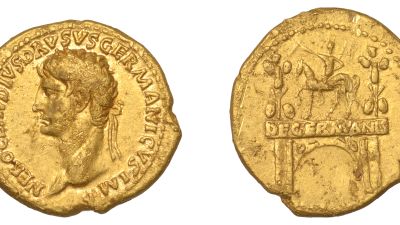Norfolk detectorist's rare Roman coin expected to fetch £5,000

A rare Roman gold coin unearthed by a beekeeper is expected to fetch up to £5000 at auction.
The gold aureus was discovered by Rob Turrell, 38, after he and his friend had been metal detecting on a field near Diss in Norfolk in January.
Mr Turrell, who lives in the area, had already found Celtic and Roman artifacts in the area.
He said on the day in question he was finishing his detecting at about 4pm when he picked up a signal on his machine.
"Suddenly beside the main road at the edge of the field I got a positive signal on my Garrett AT pro metal detector and down about 10 inches I saw a gold coin in a clump of soil.
"Not surprisingly, I was dumbstruck and sat there looking at it for the next 45 minutes unable to move as I realised, I had achieved my dream of finding a Roman goldaureus!”
The coin is to be sold at Noonans Mayfair on 18 July and has an estimate of £4,000-5,000.
Mr Turrell said he was delighted to discover the rare find.
He said: “I sent a message to my girlfriend telling her what I had found, and she promptlydrove over with a cold beer to congratulate me!”
Nigel Mills, a coin expert at Noonans, said: “The coin is an aureus weighing 7.70 grams of pure gold, struck by the emperor Claudius in AD 41-2 with the portraitand name of his father Nero Claudius Drusus, a highly respected general and consul.
"The reverse shows a triumphal arch surmounted with an equestrian statue of Drusus with 'DE GERMANIS' across the architrave."
The inscription records Claudius's celebrated campaigns subjugating the Germanic tribes in 12-9 BC.
Mr Mills said: "He was in fact renowned within the Roman army for defeating many of the Celtic chiefs in single combat before his untimely death in 9 BC after a riding accident.”
He said the aureus would have been a month’s pay for a Roman soldier and waslikely to have been lost shortly after Claudius invaded in AD 43.
Mr Turrell, who has been detecting for 10 years, manages 67 hives of bees for thesurrounding estates in the summer, while working heavy machinery in the winter.
He will share the proceeds from the sale with the landowner.
Want a quick and expert briefing on the biggest news stories? Listen to our latest podcasts to find out What You Need To Know